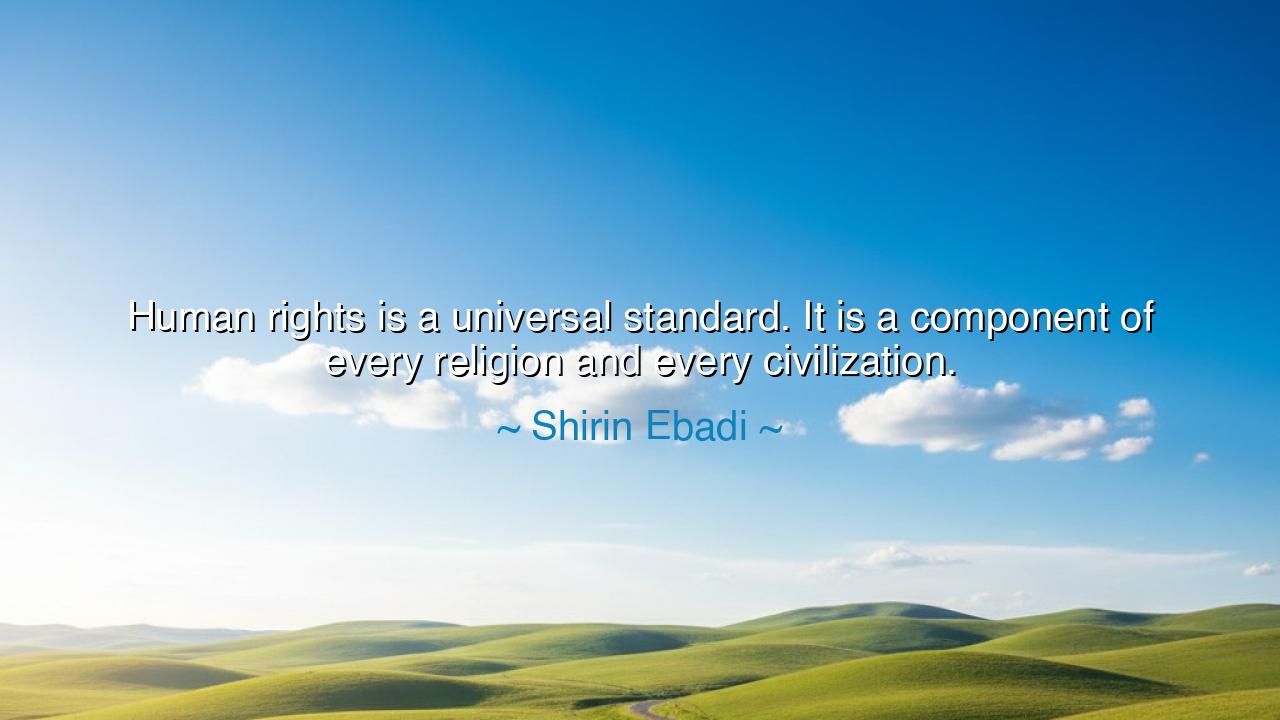
Human rights is a universal standard. It is a component of every
Human rights is a universal standard. It is a component of every religion and every civilization.






Hear, O children of justice, the words of Shirin Ebadi, Nobel laureate and defender of the oppressed: “Human rights is a universal standard. It is a component of every religion and every civilization.” This utterance shines like a torch in the long corridors of history, reminding us that dignity is not the property of one people, nor the invention of a single age. Rather, human rights are woven into the fabric of existence, whispered in every sacred text, carved in every just law, and upheld in the conscience of every civilization that has sought to honor the worth of man.
For what are human rights but the recognition that every soul, no matter its race, creed, or station, carries a spark of the divine? Ebadi, herself born into a culture steeped in both tradition and struggle, speaks not as one rejecting the heritage of faith, but as one revealing its hidden unity. In Christianity, we hear the cry: “Love thy neighbor as thyself.” In Islam, the teaching: “Whoever kills a soul… it is as if he had slain all mankind.” In Buddhism, the call to compassion for all living beings. Across civilizations—Greek, Indian, Chinese, African—the drumbeat is the same: respect for life, dignity for the weak, justice for all.
Consider the story of Cyrus the Great, king of Persia, who in 539 BCE issued what is now called the Cyrus Cylinder, proclaiming freedom of religion and the right of conquered peoples to live in peace. His empire, vast and diverse, was bound not by uniformity, but by respect for difference. Centuries before the modern age spoke of rights, here was a leader practicing them, proving that civilization and human rights are not enemies, but companions.
Yet history also teaches that when this truth is forgotten, civilizations crumble. Think of the cruelty of slavery, defended for centuries by those who cloaked injustice in the garments of power. The wealth of nations was built upon the suffering of the chained. But the human spirit rebelled. Abolitionists rose, prophets thundered, revolutions ignited, until finally, the chains were broken. The lesson is eternal: where human rights are denied, the very foundation of civilization is shaken, for no culture can endure forever that builds itself upon oppression.
Ebadi’s words are also a rebuke to those who claim that human rights are a Western invention, alien to their culture or faith. She reminds us that rights are not foreign imports, but seeds planted in every soil, waiting to be watered by justice. When governments oppress in the name of tradition, they do not honor their heritage—they betray it. For true religion, true civilization, has always held the dignity of man at its heart.
The lesson for us, then, is clear: do not allow divisions of creed, nation, or ideology to blind you to the universal. Defend the rights of others as if they were your own, for in truth they are. When you see injustice, do not remain silent, for silence is the ally of oppression. Remember that every civilization and every religion has taught, in its own tongue, that the weak must be protected, the stranger welcomed, the innocent preserved.
So I say to you, O heirs of the future: walk as guardians of dignity. Let your speech defend the voiceless, let your actions lift the fallen, let your faith—whatever it may be—be proven not by words, but by justice. In doing so, you will fulfill the wisdom of Shirin Ebadi: that human rights are not a gift from rulers, nor the invention of modern law, but the eternal inheritance of mankind, a standard as universal as the sun, as ancient as the dawn.






AAdministratorAdministrator
Welcome, honored guests. Please leave a comment, we will respond soon